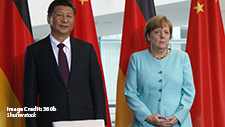Conflicting Views on Global Governance between China and the U.S.
Ramses Amer
The new National Security Strategy (NSS) of the United States – which was published in February 2015 – not only provides the most authoritative account of the country’s strategic thinking, but also on the views and policies on global governance of the U.S. This article intends to compare the views and policies of the U.S. with those of China in terms of the governance of the international system with the aim of shedding light on the future scenario of their interaction.
Related Publications
-
ISDP Annual Report 2023
ISDP’s Annual Report for the year 2023. We look back on 2023, a year in which tensions and conflicts captured the strategic space in ISDP’s focus areas, making headlines around […]
-
Merkel’s China Legacy
Abstract Angela Merkel’s time as the Chancellor of Germany is soon coming to an end. An unofficial mainstay of the European Union, she leaves office having helped put in place […]
-
India-Japan-Philippines: A Strategic Maritime Trilateral or More?
Regional states like India, Japan, and the Philippines have been seeking cooperative solutions with other middle powers that can both counter the Chinese influence and fulfill other economic as well […]
-
IN DEFENSE OF THE LIBERAL INTERNATIONAL ORDER
In recent years, the geopolitical fight for global economic, diplomatic, and institutional control has acutely intensified, accentuating the crisis in the existing post-World War II Liberal International Order (LIO), championed […]
-
Indo-Pacific Security in 2030-35: Links in the Chain
In recent years, events like the COVID-19 pandemic and the Russia-Ukraine war have brought global supply chains squarely under the spotlight. The economic impact of these disruptive events exposed the […]




